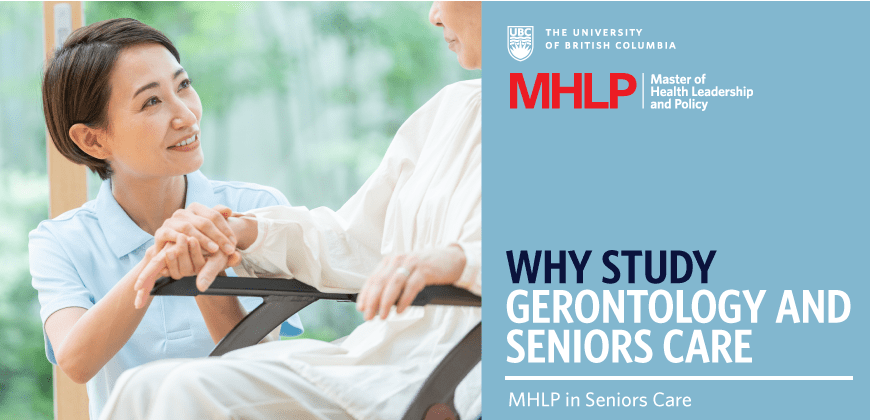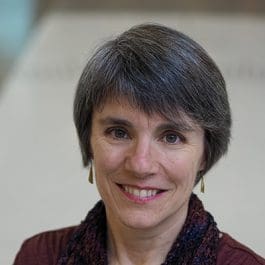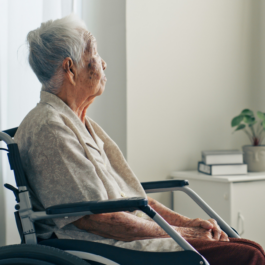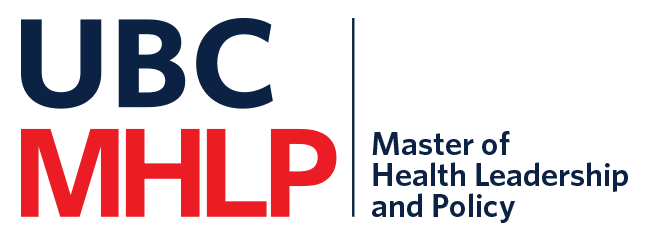Why Study Gerontology and Seniors Care?

Our population is aging. In Canada, those aged 85 and older represent the fastest-growing age group. This population has doubled in size since 2001, and predictions are that in the 25 years between 2022 and 2046, the number of people older than 85 will triple.
Many members of this population face health-related issues. As Statistics Canada says, as more people live beyond 85, we’ll see an increase in health challenges that “will put increasing pressure on all levels of government to ensure adequate support, in areas such as housing, health care and home care, as well as transportation, among other things.”
This underlines the acute need for health-care professionals with expertise in geriatric care and nursing. We need leaders with innovative ideas for how to effectively deliver patient-centred care and who have the project management, leadership and communication skills to bring diverse stakeholders together and guide teams to achieve results.
“Individuals who want to be leaders in seniors care are stepping in to a very complex environment,” says Alison Phinney, Director of the MHLP in Seniors Care.
“The way we fund seniors care, the impact of social determinants on health outcomes, the policies we’ve developed and the attitudes we hold about older adults all contribute to both challenges and opportunities for leadership.”
A curriculum focused on geriatric care
The MHLP in Seniors Care offers an interdisciplinary curriculum that equips students with the skills they need to move into leadership positions. Students cover courses in social epidemiology, philosophies of care, organizational considerations for fostering health, research and evidence-based practice, topics in social and environmental planning, and the politics of health policy.
Together, these courses enable students to understand and apply principles of environmental gerontology, analyze and use data for technical decision-making, understand the many non-technical issues that impact the sector, and conduct relevant quality assurance research.
Courses are taught by renowned experts in their field from the School of Nursing in UBC’s Faculty of Applied Science.
Preparing students to be gerontology care leaders
Being a health care leader requires much more than knowledge of best practices in gerontology. Leaders in aged care need an understanding of fundamental business knowledge that includes project management and organizational leadership. Approximately 30 per cent of the MHLP in Seniors Care curriculum focuses on these and other topics through courses taught by faculty from UBC Sauder’s Robert H. Lee Graduate School, one of the world’s top-ranked graduate business schools. An intense three-week course in the summer delves into six core business competencies, including accounting, organizational behaviour, finance, marketing, business technology management and professional development.
“Group-based project work and class discussions create opportunities to practice integrating multiple perspectives,” notes Dr. Phinney. She adds that this combination of health-care and business skills empowers students “to move their decision making and perspectives to a different and larger level.”
Advancing into leadership positions in geriatric care
Graduates of the MHLP in Seniors Care are in high demand in public, private and not-for-profit settings.
Some students, like Margaret Lin, have used the degree to transition from working as a frontline nurse to a position where she has the potential for far-reaching impact on the health of older populations and for helping transform the system.
Similarly, Laura Frisby moved from working in long-term care facility as a registered dietician to serving as the regional palliative lead at Vancouver Coastal Health.
“A clinically focused master’s degree would not have helped me grow my leadership and project management skills to the same degree,” she says.
“This program allowed me to develop a specialization in seniors care while also building skills in other in other areas that are enabling me to have a more far-reaching impact.”
Start your future as a leader in geriatric care
The MHLP in Seniors Care was designed for professionals who want to make a difference by deepening both their health care and their business knowledge. As described in our article Speaking the language of business is fundamental to leadership, the dual focus of the degree offers significant benefits, enabling graduates to “communicate technical issues with a broad range of non-technical stakeholders – from those in their organization responsible for approving budgets and setting strategy to policymakers, government agencies, the public and third-party consultants.”
Alex Chui, a 2016 graduate of the MHLP in Seniors Care, says the program “helps you switch your viewpoint to see things from more of a business focus, which is important if you want to move into leadership roles.”
If you’re interested in making a far-reaching impact on quality of life for an older population, the MHLP in Seniors Care could be the path for you. As Lillian Hung, an instructor in the program has stated, “The MHLP curriculum helps [students] understand the larger systemic factors that contribute to these challenges in geriatric care and launches many conversations about what system and policy changes are needed to create a more resilient and sustainable sector.”
Seniors Care
Move your career forward as a health-care specialist dedicated to improving patient outcomes and fostering the well-being of seniors.
Read MoreApplication Deadlines
The online application portal for the January 2025 has closed.
Get ready to apply!
Admissions for the 2026 intake will open on January 1, 2025.
How to ApplyJoin us for an
Info Session
Sign up for our latest online information sessions and discover what our programs have to offer.
Sign Up NowFeatured Faculty and Staff

DR. ALISON PHINNEY
Featured Alumni

Margaret Lin
Margaret Lin exemplifies the power of following your curiosity and actively pursuing opportunities. One thing led to another after she completed a course project on a topic she was keenly interested in – and she is now working in a position she loves where she has a far-reaching impact on senior health.


